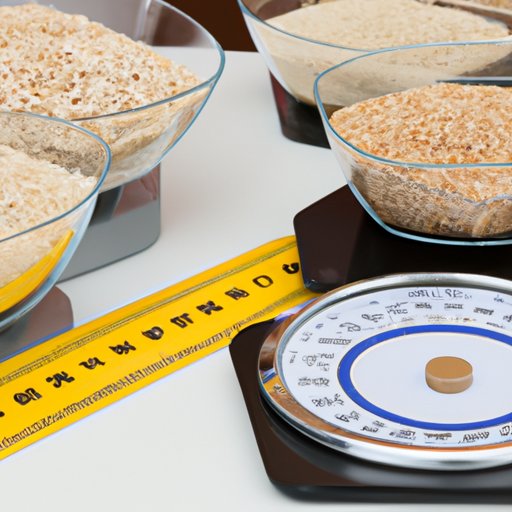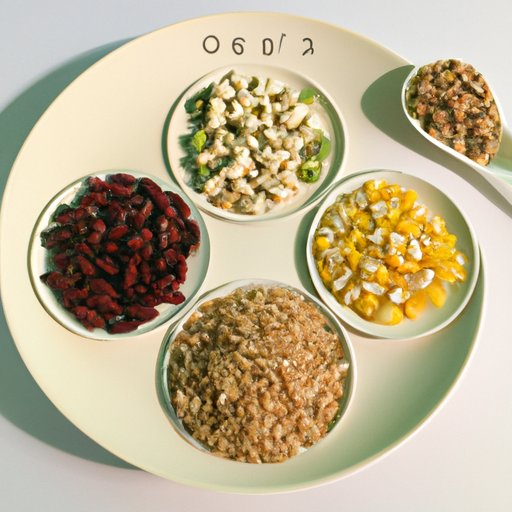Introduction
Grains are a staple food in many cultures around the world and have been part of the human diet for thousands of years. But what exactly are grains and why are they so important for our health? Grains are cereal crops that grow from the earth, such as wheat, rice, oats, corn, barley, rye, sorghum, millet, and quinoa. These grains are a great source of essential vitamins, minerals, and fiber, and can be eaten both cooked and raw. Eating a variety of whole grains is an important part of any healthy diet and provides numerous health benefits.
Exploring the Health Benefits of Whole Grains
Whole grains provide energy and nutrients to keep us healthy and energized throughout the day. They are an excellent source of vitamins and minerals, such as magnesium, B vitamins, iron, zinc, and selenium. Whole grains also contain dietary fiber, which helps promote digestive health and can help reduce the risk of some diseases. Eating a variety of whole grains can help you get all the essential nutrients your body needs to stay healthy.
Understanding How Grains Fit into a Balanced Diet
Eating a variety of whole grains is an important part of any balanced diet. The Dietary Guidelines for Americans recommends that adults consume at least 6 ounces of grains per day, with at least half of those coming from whole grains. Whole grains should be included in every meal and snack, as they provide essential vitamins and minerals, dietary fiber, and other important nutrients. Eating a variety of whole grains can help ensure you get all the essential nutrients your body needs for optimal health.
Examining the Nutrients Found in Grains
Whole grains are packed with essential vitamins, minerals, and other nutrients. They are a great source of complex carbohydrates, which provide energy and help fuel the body. Whole grains are also a good source of dietary fiber, which helps promote digestive health and can help reduce the risk of some diseases. Whole grains are also rich in B vitamins, which are important for energy production and metabolism. Additionally, whole grains contain antioxidants, which help protect the body from free radical damage.

Comparing Different Types of Grains
There are many different types of grains available, each with its own unique nutritional profile. Some of the most popular types of grains include wheat, oats, barley, corn, brown rice, quinoa, millet, and buckwheat. Each type of grain contains different amounts of vitamins, minerals, and other nutrients, so it’s important to eat a variety of grains to get all the essential nutrients your body needs.
Investigating How Grains Impact Digestive Health
Eating a diet rich in whole grains can help promote digestive health. Whole grains are high in dietary fiber, which helps keep the digestive system running smoothly. Dietary fiber helps add bulk to stool, which helps move food through the digestive tract more quickly and efficiently. Additionally, dietary fiber helps feed the beneficial bacteria in the gut, which helps promote overall digestive health.

Exploring the Role of Fiber in Digestive Health
Dietary fiber is an important nutrient for digestive health. It helps add bulk to stool and helps move food through the digestive tract more quickly and efficiently. Additionally, dietary fiber helps feed the beneficial bacteria in the gut, which helps promote overall digestive health. Eating a diet rich in fiber can help reduce the risk of constipation, diverticular disease, hemorrhoids, and other digestive disorders.

Understanding How Grains Can Help Manage Weight
In addition to promoting digestive health, eating a diet rich in whole grains can also help with weight management. Whole grains are high in fiber and protein, which helps keep you feeling full longer and can help prevent overeating. Additionally, whole grains are low in calories and fat, which makes them a great choice for people trying to lose or maintain their weight.

Analyzing the Role of Grains in Weight Management
Whole grains are an important part of any weight loss or weight maintenance plan. Eating a variety of whole grains can help you feel fuller longer and can help prevent overeating. Additionally, whole grains are low in calories and fat, which makes them a great choice for people trying to lose or maintain their weight. Eating a diet rich in whole grains can also help reduce the risk of obesity and other related health conditions.
Conclusion
Whole grains are an important part of any healthy diet. Eating a variety of whole grains can help ensure you get all the essential vitamins, minerals, and other nutrients your body needs to stay healthy. Whole grains are also high in dietary fiber, which helps promote digestive health and can help reduce the risk of some diseases. Additionally, eating a diet rich in whole grains can help with weight management and can help reduce the risk of obesity and other related health conditions.
(Note: Is this article not meeting your expectations? Do you have knowledge or insights to share? Unlock new opportunities and expand your reach by joining our authors team. Click Registration to join us and share your expertise with our readers.)
